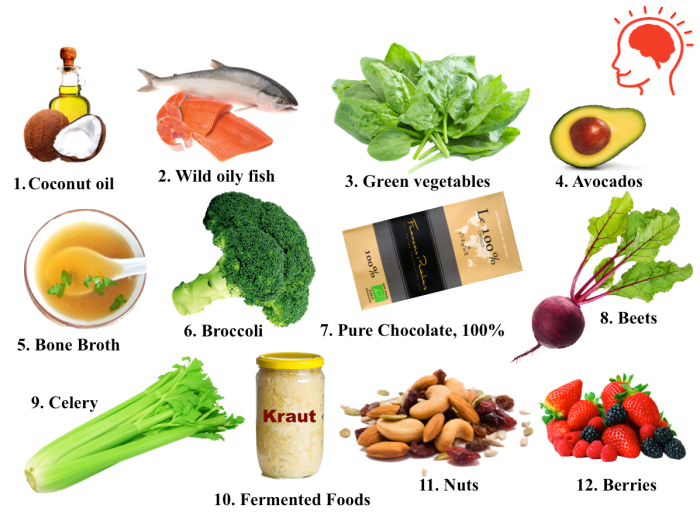Best foods for brain health – Boost your brain power with these nutritious foods! Dive into a world of vibrant fruits, brain-boosting nuts, and omega-3 rich fish as we explore the key to a sharp mind and healthy brain function.
Discover the colorful array of fruits and veggies, the benefits of omega-3 from fatty fish, and the memory-enhancing powers of nuts and seeds. Get ready to take your brain health to the next level with these delicious and nutritious options!
Overview of Brain-Boosting Foods
Eating the right foods can have a significant impact on brain health and cognitive function. A healthy diet plays a crucial role in maintaining optimal brain health, improving memory, focus, and overall mental well-being.
Types of Brain-Boosting Foods
- Fatty Fish: Rich in omega-3 fatty acids, essential for brain function and development.
- Blueberries: Packed with antioxidants that help protect the brain from oxidative stress and inflammation.
- Broccoli: High in antioxidants and vitamin K, which supports brain health and cognitive function.
- Nuts and Seeds: Good sources of vitamin E, which has been linked to improved brain health.
- Dark Chocolate: Contains flavonoids that can help improve memory, focus, and overall cognitive function.
Importance of a Healthy Diet for Brain Function, Best foods for brain health
A balanced diet rich in brain-boosting foods provides essential nutrients that support cognitive function and protect the brain from age-related decline. Nutrients like omega-3 fatty acids, antioxidants, vitamins, and minerals play a crucial role in maintaining brain health and optimizing mental performance.
Nutrients that Support Cognitive Function
- Omega-3 Fatty Acids: Found in fatty fish, walnuts, and flaxseeds, essential for brain health and cognitive function.
- Antioxidants: Found in berries, vegetables, and dark chocolate, help protect the brain from oxidative stress and inflammation.
- Vitamins and Minerals: Essential for overall brain health, including vitamin E from nuts and seeds, vitamin K from leafy greens, and magnesium from whole grains.
Fruits and Vegetables

Eating a variety of colorful fruits and vegetables can greatly benefit brain health due to their high antioxidant content. Antioxidants help protect the brain from oxidative stress, which is linked to cognitive decline and neurodegenerative diseases.
List of Colorful Fruits and Vegetables Rich in Antioxidants
- Blueberries: Packed with flavonoids that have been shown to improve memory and cognitive function.
- Spinach: Rich in vitamin K, lutein, folate, and beta carotene, which help slow cognitive decline.
- Broccoli: Contains high levels of antioxidants, including vitamin C and beta carotene, that support brain health.
- Oranges: Loaded with vitamin C, a powerful antioxidant that helps protect brain cells from damage.
- Tomatoes: Rich in lycopene, a potent antioxidant that may reduce the risk of developing dementia.
Recipes Incorporating Brain-Boosting Fruits and Vegetables
- Blueberry Spinach Smoothie: Blend blueberries, spinach, banana, and almond milk for a delicious brain-boosting smoothie.
- Broccoli and Tomato Quinoa Salad: Combine cooked quinoa with steamed broccoli, cherry tomatoes, lemon vinaigrette, and feta cheese for a nutritious meal.
- Orange Glazed Carrots: Roast carrots with orange juice, honey, and thyme for a tasty side dish packed with antioxidants.
Fatty Fish and Omega-3: Best Foods For Brain Health
Eating fatty fish rich in omega-3 fatty acids is essential for brain health and cognitive function. These healthy fats play a crucial role in maintaining brain function and structure.
Types of Fatty Fish High in Omega-3
- Salmon
- Mackerel
- Sardines
- Trout
- Herring
How Omega-3 Fatty Acids Benefit Brain Health
Omega-3 fatty acids are important for building brain cell membranes, reducing inflammation, and improving the flow of neurotransmitters. They have been linked to improved memory and cognition, as well as a reduced risk of cognitive decline as we age.
Cooking Methods to Retain Nutritional Value
Grilling, baking, or steaming fish are great ways to preserve the omega-3 content without adding unhealthy fats.
Avoid deep-frying fish, as it can reduce the nutritional value of the omega-3 fatty acids.
Nuts and Seeds
Nuts and seeds are excellent sources of brain-boosting nutrients that can help improve memory and overall brain health. Incorporating a variety of nuts and seeds into your diet can provide numerous benefits for cognitive function.
Types of Nuts and Seeds
- Almonds: Rich in vitamin E, an antioxidant that helps protect brain cells from oxidative stress.
- Walnuts: High in omega-3 fatty acids, which are essential for brain function.
- Flaxseeds: Contain alpha-linolenic acid, a type of omega-3 fatty acid that supports brain health.
- Chia seeds: Packed with fiber, protein, and omega-3 fatty acids, all beneficial for brain function.
- Pumpkin seeds: Excellent source of iron, zinc, magnesium, and copper, important minerals for brain health.
Benefits of Consuming Nuts and Seeds
- Nuts and seeds are rich in antioxidants, which help reduce inflammation and protect brain cells from damage.
- The omega-3 fatty acids in nuts and seeds can improve cognitive function and support overall brain health.
- The minerals present in nuts and seeds, such as iron and zinc, play a crucial role in neurotransmitter function and cognitive processes.
Creative Ways to Incorporate Nuts and Seeds
- Sprinkle chopped nuts and seeds over yogurt or oatmeal for a nutritious breakfast.
- Add crushed nuts and seeds to salads for extra crunch and flavor.
- Use nut butters as a dip for fruits or spread on whole grain toast for a satisfying snack.
- Blend nuts and seeds into smoothies for a creamy texture and added nutrients.
